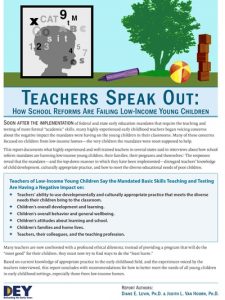In our Teachers Speak Out series
Diane E. Levin, PhD and Judith L. Van Hoorn, PhD‘ publish this report that finds that the mandates disregard teachers’ knowledge of child development, culturally appropriate practice, and how to meet the diverse educational needs of poor children.
In the wake of federal and state education mandates, this report documents interviews with early childhood teachers across the country about how school reforms negatively affect low-income young children.
Soon after the implementation of federal and state early education mandates that require the teaching and testing of more formal “academic” skills, many highly experienced early childhood teachers began voicing concerns about the negative impact the mandates were having on the young children in their classrooms.
Many of these concerns focused on children from low-income homes – the very children the mandates were most supposed to help.
This report documents what highly experienced and well-trained teachers in several states said in interviews about how school reform mandates are harming low-income young children, their families, their programs and themselves.
The responses reveal that the mandates – and the top-down manner in which they have been implemented – disregard teachers’ knowledge of child development, culturally appropriate practice, and how to meet the diverse educational needs of poor children.
Teachers of low-Income Young Children say the mandated basic skills teaching and testing are having a negative impact on:
- Teachers’ ability to use developmentally and culturally appropriate practice that meets the diverse need their children bring to the classroom.
- Children’s overall development and learning.
- Children’s overall behavior and general wellbeing.
- Children’s attitudes about learning and school.
- Children’s families and home lives.
- Teachers, their colleagues, and the teaching profession.
Many teachers are now confronted with a profound ethical dilemma. Instead of providing a program that will do the “most good” for their children, they must now try to find ways to do the “least harm”.
Based on current knowledge of appropriate practice in the early childhood field, and the experiences voiced by the teachers interviewed, this report concludes with recommendations for how to better meet the needs of all young children in early childhood settings, especially those from low-income homes.
Read the full 16-page report here.
Read the two-page summary report here.
You can read more of Defending the Early Years’ reports and position papers.

